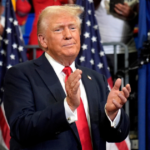The Olympics showcase numerous sports and athletes every four years, illuminating their dedication and hard work along the way.
For many Olympic athletes, especially in the U.S., their motivation stems from passion rather than financial gain.
Take U.S. track and field star Will Claye, who secured silver medals in triple jump in both the 2012 London and 2016 Rio Olympics, as well as a bronze in long jump in 2012.
“The medals — I put the medals away. You know, I never really basked in the medals because I was always chasing another medal,” shared Claye.
Claye was fortunate to have a shoe sponsorship that supported his training expenses.
RELATED STORY | Photo finish: Noah Lyles wins gold in men’s 100-meter Olympic final
However, in the recent Tokyo games, he narrowly missed another triple jump medal by an inch and failed to qualify for this year’s team.
“Right now, I don’t have a super sponsor because I didn’t make the team. The last Olympics I got fourth, you know. So at that point, my shoe company that I was with — I was with Puma, they dropped after I didn’t get a medal,” Claye lamented.
The U.S. team relies on private funding as it is not government-backed, leaving athletes to support themselves. While some athletes earn millions through endorsements, most do not.
The U.S. women’s rugby team’s remarkable bronze win in Paris has garnered newfound attention and support.
“I trained with a lot of those ladies in Chula Vista. So I’ve seen them, a lot of them, for the past eight years,” Claye stated. “At the training center, grinding it out, making it happen. Then they came out with a bronze medal and just the support they’re getting right now is amazing to see.”
A generous $4 million donation from Michelle Kang, owner of the National Women’s Soccer League’s Washington Spirit franchise, will aid the women’s rugby team in preparing for the 2028 Games in LA.
Rapper Flavor Flav is sponsoring the U.S. women’s water polo team.
Looking ahead to the 2028 LA Games, Claye is determined to secure support for his journey, acknowledging the financial challenges associated with Olympic training.
“I’m just hoping that I can get a little bit more support leading into 2028. It’s expensive. You see LeBron James spend $1 million on therapy alone just to maintain his performance. He’s playing like he’s 25 out there right now,” Claye emphasized.
Although most Olympians cannot afford elite resources like high-cost therapists, their unwavering determination keeps them striving for Olympic success.





